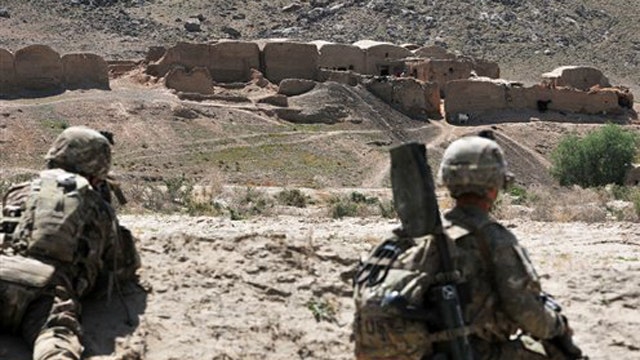Five American Troops killed by IED in Afghanistan
Five American Troops killed by IED in Afghanistan
Seven U.S. service members were killed on Saturday in one of the deadliest days for Americans in Afghanistan in recent months and the latest of attacks against international troops since the Taliban announced the start of their spring offensive.
The renewed violence came as Afghan President Hamid Karzai acknowledged at a news conference that regular payments his government has received from CIA for more than a decade would continue. Karzai also said that talks on a U.S.-Afghan bilateral security agreement to govern future American military presence in the country had been delayed because of conditions the Afghans were placing on the deal.
The U.S.-led coalition reported that five international troops were killed by a roadside bomb in southern Afghanistan, and coalition spokesman Capt. Luca Carniel confirmed that all five were American.
The coalition did not disclose the location of the roadside bombing, however, Javeed Faisal, a spokesman for the governor of Kandahar province, said the coalition patrol hit the bomb in Maiwand district of the province, the spiritual birthplace of the Taliban.
Later, the coalition reported that a soldier with the Afghan National Army turned his weapon on coalition troops in the west, killing two in the most recent of so-called insider attacks. Such attacks by members of the Afghan security forces against their fellow colleagues or international troops have eroded confidence in the Afghan forces as they work to take over from foreign forces.
Both killed were American, according to two U.S. officials who spoke on condition of anonymity to disclose the nationalities ahead of an official announcement.
It was the third time since last summer than seven Americans have been killed on a single day in the war.
On April 6, Afghan militants killed six Americans, including a young female diplomat, and an Afghan doctor in a pair of attacks in southern Afghanistan. The three U.S. service members, two U.S. civilians and the doctor were killed when the group was struck by an explosion while traveling to donate books to a school. A seventh American, a civilian, was killed in a separate insurgent attack in the east.
On Aug. 16, 2012, seven American service members were killed in two attacks in Kandahar province. Six were killed when their helicopter was shot down by insurgents and one soldier died in a roadside bomb explosion.
At the news conference, Karzai said he had met earlier in the day with the Kabul station chief of the CIA and was reassured that the agency's payments to the Afghan government would continue. The New York Times had reported that for more than a decade, the CIA had given the Afghan National Security Council tens of millions of dollars in monthly payments delivered in suitcases, backpacks and plastic shopping bags.
Karzai said he told the station chief: "`Because of all these rumors in the media, please do not cut all this money because we really need it. We want to continue this sort of assistance.' And he promised that they are not going to cut this money."
Karzai described the payments as a form of "government-to-government" assistance, and while he wouldn't say how much the CIA gave to the National Directorate of Security, which is the Afghan intelligence service, he said the financial help was very useful. He claimed that much of the money was used to care for wounded employees of the NDS, Afghanistan's intelligence service, and operational expenses.
"We have spent it in different areas (and) solved lots of our problems," Karzai said.
He said the CIA payments were made in cash and that "all the money which we have spent, receipts have been sent back to the intelligence service of the United States monthly."
The CIA declined to comment on Saturday.
During the news conference at the presidential palace, Karzai also discussed ongoing negotiations on a U.S.-Afghan bilateral security agreement. He said talks had been delayed because of certain conditions that Afghanistan was insisting be included in the pact, which will govern a U.S. military presence after 2014 when nearly all foreign combat troops are to have finished their withdrawal from Afghanistan. The talks, which started in late 2012, are set to last up to a year.
President Barack Obama has not said how many troops will remain, although there have been estimates ranging from 8,000 to 12,000. It is unlikely such an announcement will be made until the security agreement is signed. Those troops would help train Afghan forces and also carry out operations against al-Qaida and other militant groups.
Karzai said Afghanistan was ready to sign a deal as long as the American government in exchange for being able to stay on bases in the country agrees to terms of Afghan security, funding assistance and help with training and equipping Afghan security forces. It is thought that the contentious issue of providing U.S. troops immunity from Afghan law is a low priority for the Afghan government in the negotiations.
The Afghan government has not said how much rent it would want for three or four U.S. bases, but it is believed to be in the billions. Afghanistan is also thought to be seeking security guarantees to protect its porous borders, including the frontier with Pakistan that is the main infiltration route for insurgents who retain sanctuary in Pakistan's lawless tribal areas.
It was unclear how Karzai expected the United States or any of its allies to guarantee Afghanistan's borders against attack.





















